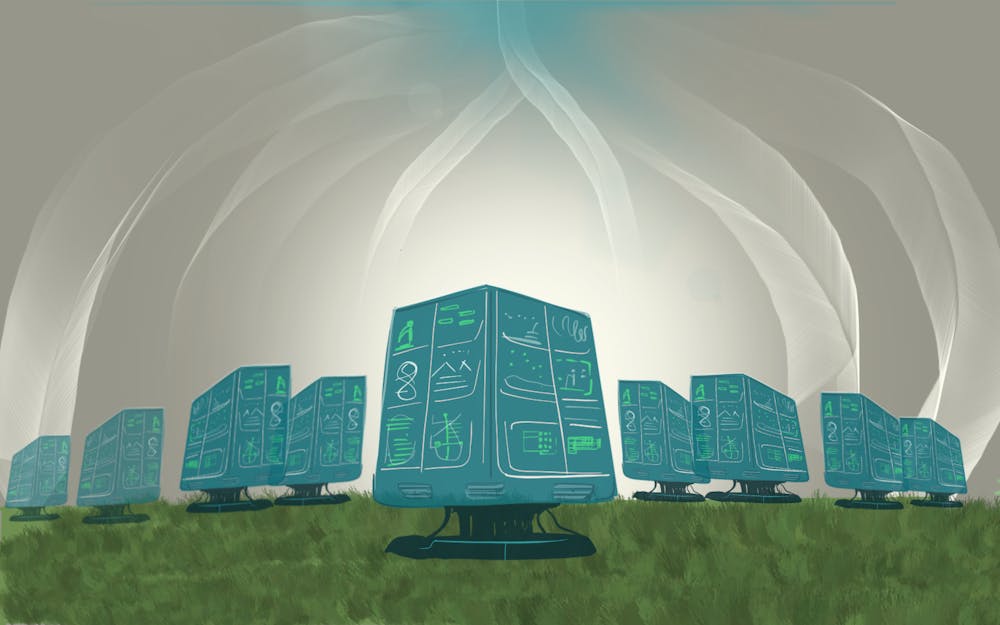For the past several years, I’ve been inundated with conversations, posts and columns about how generative AI is coming for every creative job. Some argue that generative AI can help improve creativity, while others argue that its inherent plagiarism makes it incomparable to human creation.
Generative AI includes applications like ChatGPT, Sora and Adobe Firefly, all of which can generate text, videos or images based on just a few prompts. Understandably, many are concerned with the impact on creative fields. Will companies and individuals still pay for art if they can generate it in seconds for free?
Despite this discourse, one aspect I’ve never seen brought up in all of these conversations is the material workings of AI. Even as we boil in one of the hottest summers on record, AI continues to chug away. Just how many increasingly-precious resources are being rerouted to craft the photos of six-fingered veterans your grandma reposts on Facebook?
As it turns out, a lot. A search on ChatGPT consumes nearly 10 times the energy as a Google search. Training a language model like ChatGPT itself uses about 1,300 megawatt hours — the equivalent to a year of power for 130 American homes.
As of 2022, electricity consumption for data centers, cryptocurrencies and artificial intelligence represented 2% of global demand — 460,000,000,000 kilowatt hours (kWh). By 2026, this usage could double — to about the energy usage of Japan. That’s 1,000,000,000,000 kWh. Yes, that’s 12 zeros.
Even with the best intentions, these projects only exacerbate our issues with emissions. Many big technology companies like Meta are “committed to accelerating the renewable energy transition.” But, at the same time, Meta is building a $1.5 billion data center in the Salt Lake City area. To keep up with energy demands, lawmakers pushed back the retirements of several coal power plants to decades away. Even if Meta buys enough renewable energy to offset the coal emissions, they’re still directly contributing to climate change.
This is just another instance of entrepreneurs burning up our planet to make small material improvements to our lives. For example, Elon Musk’s SpaceX rockets present a myriad of problems for Earth. Satellites orbiting the Earth — of which SpaceX hopes to have 42,000 in just their Starlink program — eventually fall and damage the planet’s ozone layer. Excessive amounts of methane, carbon dioxide and water vapor are released by every rocket launch, which all contribute to the warming of our world.
As of last year, 60% of the US power grid was powered by fossil fuels. With rising energy demands from AI innovations and no end in sight, we can expect more emissions pumping into our atmosphere.
Innovations in generative AI are exactly the opposite of what we need right now. We’re facing an inevitable climate collapse at this rate. Meanwhile, the biggest companies on the planet are focused on creating artifical videos and flying to Mars instead of finding solutions. The only people with the power to fix the mess we’re in have their heads buried in the entrepreneurial sand.
We need to focus on the people that live on this planet, not the computers.
In times like these, I’m reminded of John Prine’s song “Paradise,” where he describes a Kentucky town being destroyed by coal strip mining. After the coal company razes Paradise for its resources, “they wrote it all down as the progress of man.”
Progress simply for progress’s sake is no longer progress. The innovations of generative AI and satellite internet do nothing for us as a species if they destroy our planet along with it.
The U.S. and governments worldwide need to regulate these massive data centers. Drastic actions need to be taken if we expect to stop or reverse climate change any time soon. The United States has released more greenhouse gases than China or India, the world’s most populous countries. We need to invest in reducing emissions, expanding renewable energy sources and using land sustainably. 2023 was the warmest year on record — we can’t let these rising temperatures continue.
Personally, I’d be okay with living without ChatGPT and with a cleaner, cooler world.
Danny William (they/them) is a junior studying cinematic arts.






